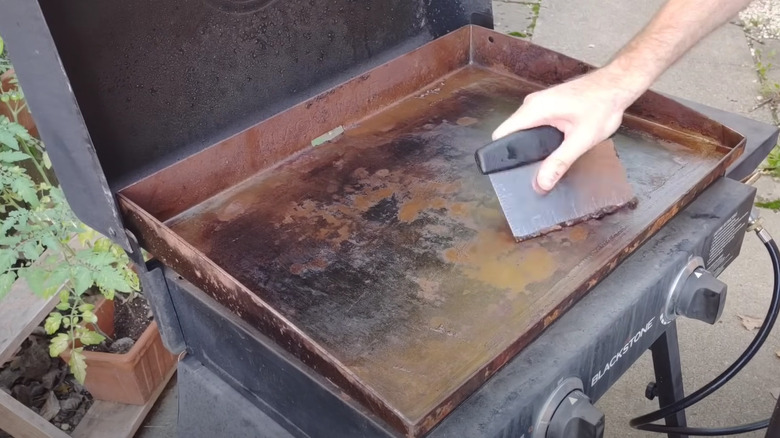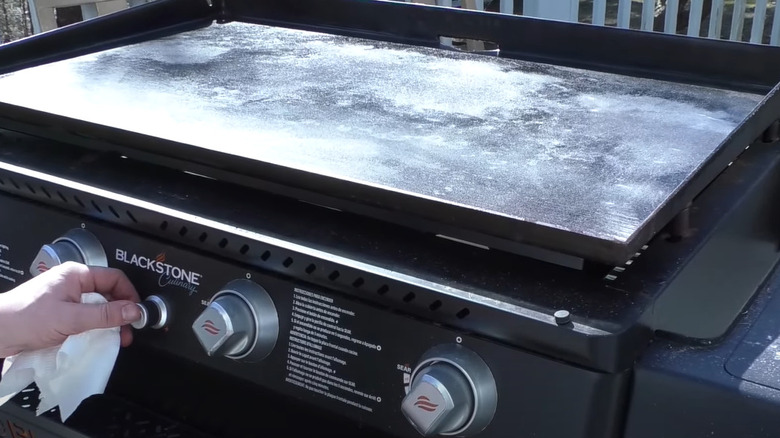Remove Stubborn Rust From Blackstone Griddles With An Everyday Cooking Ingredient
Ah, that moment you're side-eyeing your Blackstone griddle, feeling a touch heartbroken over how what once was the shining star of your DIY outdoor kitchen space has fallen victim to rust and now wouldn't look out of place in a spooky underwater documentary. However, hold off on mourning your griddle's end of life or googling for its replacements. Surprisingly, your golden ticket to easily clean rust off your Blackstone griddle might be a cooking staple hiding in your kitchen. Enter cooking oil. That's right; the same stuff you've been drizzling to get those burgers to slide off the griddle, now complemented with a few tools like a metal scraper, is about to moonlight as your rust-busting hero.
Rust — that clingy nuisance that doesn't know when to leave — tends to show up when your steel griddle has been playing too cool with moisture and air for too long. Maybe it's been braving the elements a bit too much, you've been a bit lax with drying it, or perhaps it's just the humidity playing games. Cooking oil like extra virgin olive oil enters the picture here, penetrating and loosening the rust, making it easier to scrape and clean off. Plus, it prevents future rusty invasions by creating a protective barrier that binds more effectively to the metal than water ever could. The cherry on top? It's a safe and kitchen-ready solution, free from the harsh chemicals in some commercial rust removers.
Removing rust from a Blackstone griddle with cooking oil
Kicking off the process of cleaning rust off metal appliances like a Blackstone griddle with cooking oil: Fire it up, and let it run hot for at most 20 minutes. You're doing this to loosen the rust, making it much less of a headache to scrub afterward. Once your griddle has cooled following the heat treatment, grab your metal-edge scraper and go to town on that rusty surface. And please keep water out of the equation here unless you want to feed the rust monster.
Once that griddle plate looks less like a tetanus hazard, go ahead and douse it with regular cooking oil. Then, use a grill brick to give the metal surface a solid scrubdown. Follow that by using paper towels or clean rags to wipe down, and keep at it until you don't see rust residual on those towels.
Now, here comes the grand finale: seasoning your griddle. Think of it like you're armoring to fend off rust. Grab cooking oil – or if you're feeling fancy, Black 4114 Griddle Seasoning and Cast Oil Conditioner (going for $9.97 at Walmart) — and slap a thin layer on that polished metal. Heat that griddle up again, but this time, keep it at medium heat for 15 minutes. You're on the right track when you start seeing smoke and the metal shifts in color. Repeat the procedure twice, and once your griddle cools, cover it, and stash it somewhere it won't catch moisture.
Extra considerations for removing griddle rust with cooking oil
Checking out the rust situation is a smart first step. Some of it is a piece of cake to remove, but occasionally, it digs in deep, and you might just have to part ways with that piece of metal entirely. If you're lacking a fancy metal scraper for the initial cleanup of your Blackstone, don't sweat it. Grab coarse-grit sandpaper, but take it easy. Going all "Hunk" on the rusty areas might leave your griddle dotted with uneven spots or deep scratches (think of the moon's surface). Dealing with a coated Blackstone griddle? A non-metallic scouring pad will do the trick; it's gentle yet effective, like a good exfoliator for your griddle pan.
Now, removing rust is seemingly straightforward, but let's keep it drama-free and ER visit-free. Sure, heating the cooking oil is part of the fun, but singed finger or palm? Not so much. Heat-resistant silicone gloves are your friends here. You also want to pick a spot with plenty of air to avoid any fume-fueled mishaps. Regarding how to keep Blackstone from rusting, pamper it after every cookout. That will involve scrubbing away the leftover bits, cleaning your Blackstone griddle, and dabbing on a protective coat of oil. And when it's not in use, either bring it indoors like it's part of the family or tuck it in with a weatherproof cover. Take good care of your Blackstone griddle, and it'll stay ready for your burger-flipping for years to come.


